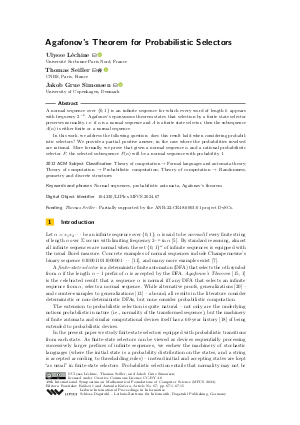Agafonov’s Theorem for Probabilistic Selectors
Authors
Ulysse Léchine  ,
Thomas Seiller
,
Thomas Seiller  ,
Jakob Grue Simonsen
,
Jakob Grue Simonsen 
-
Part of:
Volume:
49th International Symposium on Mathematical Foundations of Computer Science (MFCS 2024)
Part of: Series: Leibniz International Proceedings in Informatics (LIPIcs)
Part of: Conference: Mathematical Foundations of Computer Science (MFCS) - License:
 Creative Commons Attribution 4.0 International license
Creative Commons Attribution 4.0 International license
- Publication Date: 2024-08-23
File

PDF
LIPIcs.MFCS.2024.67.pdf
- Filesize: 0.76 MB
- 15 pages
Document Identifiers
Subject Classification
ACM Subject Classification
- Theory of computation → Formal languages and automata theory
- Theory of computation → Probabilistic computation
- Theory of computation → Randomness, geometry and discrete structures
Keywords
- Normal sequences
- probabilistic automata
- Agafonov’s theorem
Metrics
- Access Statistics
-
Total Accesses (updated on a weekly basis)
0PDF Downloads0Metadata Views
Abstract
A normal sequence over {0,1} is an infinite sequence for which every word of length k appears with frequency 2^{-k}. Agafonov’s eponymous theorem states that selection by a finite state selector preserves normality, i.e. if α is a normal sequence and A is a finite state selector, then the subsequence A(α) is either finite or a normal sequence.
In this work, we address the following question: does this result hold when considering probabilistic selectors? We provide a partial positive answer, in the case where the probabilities involved are rational. More formally, we prove that given a normal sequence α and a rational probabilistic selector P, the selected subsequence P(α) will be a normal sequence with probability 1.
Cite As Get BibTex
Ulysse Léchine, Thomas Seiller, and Jakob Grue Simonsen. Agafonov’s Theorem for Probabilistic Selectors. In 49th International Symposium on Mathematical Foundations of Computer Science (MFCS 2024). Leibniz International Proceedings in Informatics (LIPIcs), Volume 306, pp. 67:1-67:15, Schloss Dagstuhl – Leibniz-Zentrum für Informatik (2024)
https://doi.org/10.4230/LIPIcs.MFCS.2024.67
BibTex
@InProceedings{lechine_et_al:LIPIcs.MFCS.2024.67,
author = {L\'{e}chine, Ulysse and Seiller, Thomas and Simonsen, Jakob Grue},
title = {{Agafonov’s Theorem for Probabilistic Selectors}},
booktitle = {49th International Symposium on Mathematical Foundations of Computer Science (MFCS 2024)},
pages = {67:1--67:15},
series = {Leibniz International Proceedings in Informatics (LIPIcs)},
ISBN = {978-3-95977-335-5},
ISSN = {1868-8969},
year = {2024},
volume = {306},
editor = {Kr\'{a}lovi\v{c}, Rastislav and Ku\v{c}era, Anton{\'\i}n},
publisher = {Schloss Dagstuhl -- Leibniz-Zentrum f{\"u}r Informatik},
address = {Dagstuhl, Germany},
URL = {https://drops.dagstuhl.de/entities/document/10.4230/LIPIcs.MFCS.2024.67},
URN = {urn:nbn:de:0030-drops-206238},
doi = {10.4230/LIPIcs.MFCS.2024.67},
annote = {Keywords: Normal sequences, probabilistic automata, Agafonov’s theorem}
}
Author Details
Funding
- Seiller, Thomas: Partially supported by the ANR-22-CE48-0003-01 project DySCo.
References
-
V. N. Agafonov. Normal sequences and finite automata. Sov. Math., Dokl., 9:324-325, 1968. Originally published in Russian [Agafonov, 1968].

-
Dylan Airey and Bill Mance. Normality preserving operations for Cantor series expansions and associated fractals, i. Illinois J. Math., 59(3):531-543, 2015.

-
J. Auslander and Y. N. Dowker. On disjointness of dynamical systems. Mathematical Proceedings of the Cambridge Philosophical Society, 85(3):477-491, 1979.

-
Veronica Becher, Olivia Carton, and Pablo Ariel Heiber. Normality and automata. Journal of Computer and System Sciences, 81(8):1592-1613, 2015.

-
Émile Borel. Les probabilités dénombrables et leurs applications arithmétiques. Rend. Circ. Matem. Palermo, 27:247-271, 1909.

-
A. Broglio and P. Liardet. Predictions with automata. symbolic dynamics and its applications. Contemporary Mathematics, 135:111-124, 1992. Also appeared in Proceedings of the AMS Conference in honor of R. L. Adler. New Haven CT - USA 1991.

-
Yann Bugeaud. Distribution modulo one and Diophantine approximation. Cambridge Tracts in Mathematics. Cambridge University Press, 2012.

- Olivier Carton. A direct proof of agafonov’s theorem and an extension to shift of finite type. CoRR, abs/2005.00255, 2020. URL: https://arxiv.org/abs/2005.00255.
-
Olivier Carton. A direct proof of Agafonov’s theorem and an extension to shifts of finite type. Preprint, 2020.

-
Olivier Carton and Joseph Vandehey. Preservation of normality by non-oblivious group selection. Theory of Computing Systems, 2020.

-
D. G. Champernowne. The construction of decimals normal in the scale of ten. Journal of the London Mathematical Society, s1-8(4):254-260, 1933.

-
T. Kamae and B. Weiss. Normal numbers and selection rules. Israel Journal of Mathematics, pages 101-110, 1975.

-
Wolfgang Merkle and Jan Reimann. Selection functions that do not preserve normality. Theory Comput. Syst., 39(5):685-697, 2006.

-
Ivan Niven and H. S. Zuckerman. On the definition of normal numbers. Pacific J. Math., 1(1):103-109, 1951.

-
В. Н. Araфонов. Нормальные последовательности и конечные автоматы. Докл. АН СССР, 179(2):255-256, 1968.

-
Л. П. Постникова. О связи понятий коллектива Мизеса-Черча и нормальной по Бернулли последовательности знаков. Теория вероятн. и ее примен., 6(2):232-234, 1961.

-
LP Postnikova. On the connection between the concepts of collectives of Mises-Church and normal Bernoulli sequences of symbols. Theory of Probability & Its Applications, 6(2):211-213, 1961. translation of [Постникова, 1961] by Eizo Nishiura.

-
Michael O. Rabin. Probabilistic automata. Information and Control, 6(3):230-245, 1963.

-
Claus-Peter Schnorr and H. Stimm. Endliche Automaten und Zufallsfolgen. Acta Informatica, 1:345-359, 1972.

-
Xiaowen Wang and Teturo Kamae. Selection rules preserving normality. Israel Journal of Mathematics, 232:427-442, 2019.

